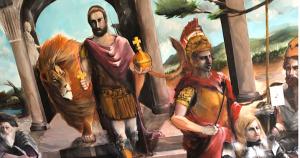Let’s see justice and become just.

This is so uncontroversial, we might be bored. We should stop, think about this, and do something.
Why?
There is a good bit of injustice around and we are all (almost surely) contributing to that state. We could begin in the Bible with the Christian ethic of love and demands for selfless leadership.
God have mercy on us.
Yet we might be deaf to this voice, having read it and explained it away too often. Instead, we find help, clarity, and the shock of a confrontation with real virtue, while reading something completely different than the Gospels. These many streams of virtue, as Saint Basil calls them, may come from a novel, a play, or movie. One fountain of virtue is Plato, a voice pointing us so often to justice. If we turn to Book IV of Plato’s Republic, the idea of selfless leadership, losing happiness to gain greater happiness is there.
The person who gives his life, finds life.
Amen.
How? What? Can I clarify?
Clarity awaits, but if we wish to think this through for ourselves and not just get an answer, then reading Republic will help.
But Wait: Read Republic Carefully
The idea that people who wish to see justice may not end up happy (in one sense), but will make happiness for others and end up happy (in another sense) is a major theme of Plato’s Republic. The lesson has been lost on leaders from Alexander the Great through Napoleon to some leaders of the American Republic in the twenty-first century.
First, a warning about Republic and how to read the book.
Plato should get credit for building the first Sim-City. He did not do this to entertain us, but to help us see the nature of justice. Ever since misguided readers have tried to build this simulation and then blamed him when things went poorly. This is as wrong headed as my trying to run an actual farm as one does in the Township game and getting testy when cows refuse to give out milk ever twenty minutes as they do in the game. One hopes that the one hundred million people playing the simulation know that making bagels is not nearly as lucrative as it seems in the game.
Don’t Playrix if you take their game too seriously, and do not blame Plato if you think his simulation is serious city-planning.
Plato is writing so any student of Socrates could see justice and so become justice. His character “Socrates” creates a “city” so that the students he is teaching (in the dialogue) can see justice born, injustice creep in, and whether the just life is good. As a result, the city is simplified, as simple as the students will accept, for that purpose. Naturally, like all of us do, the students get excited about some details and so keep missing their need to see and become just.
Fortunately at least one student has good enough vision to persist with Socrates, this student, flawed, but persistent, gives us hope.
What does the sim city do with leaders? What can we learn?
Recall, always, that the Republic teaches a person how to see justice and so become more just.* The leaders of the sim city will never exist in history, but if we consider them, and how they are educated, we can see something vital. To see justice in the simulated city, Socrates focuses on the justice of the city as a whole. He need not worry about “doing justice” to the parts.
In simulation game, you can treat people and animals in your “township” in ways that you could not in “real life.” I can move a house without asking any of the occupants permission or build it next to a factory without worry about their “health.” After all, the purpose of the game is for the township to work and less vitally the “happiness” of the individual “citizens.” I can always build them a park or a circus to get my “happiness” score up!
God forbid anyone run a real township this way! (“Jim, build those people a circus. The linen factory next to the park is making them sad.”)
What can we learn from the “guardians” of the simulation?
Oddly, because of how they are educated and how they live, if there were ever guardians, they would be happy, just not in the way people think they should be happy. In fact, the guardians will be the happiest people in the end. Why? If they live for the city and the justice of the city as a whole, they will have to develop virtues that will make them happy. These guardians will also avoid temptations that will make them sad.
The life of the guardians in the simulation is so holy, so self-sacrificing, that the young men talking to Socrates object:
“What you be your defense, Socrates, if anyone objects that you are not making these men very happy, and that through their own fault?” For the city really belongs to them and yet they get no enjoyment out of it as ordinary men do . . .” **
Socrates makes the obvious retort that in this city he is looking justice in the whole and need not find it in the parts. Still, later, we will see the very education, moderation, courage, and practical wisdom the guardians have gained means that without any of the “treats” of the city, they will be most happy.
Put simply: it is more important to be happy on the inside than the outside.
The guardians will have gained a psychological harmony and wholeness that is internal and so cannot be taken away or at least not easily so. They will be of all men happiest, because their happiness does not depend on stuff they can lose. A life of service, doing justice, is good for its own sake.
The just are happy, just not always rewarded externally! Perhaps our leadership, and schools teaching leadership, should consider that courage, moderation, practical wisdom instilled in the soul may be good for us. No education can, after all, guarantee happiness if external treats are happiness: bad luck happens. The just man has happiness much harder to steal and the joy of serving the city he loves. Our leaders will be happiest, because they have been kept from depending on (superficial or external) happiness.
How happy? This happy:
. . . And they will live a happier life that men count most happy, the life of the victors of the Olympics****.
Let’s look for leaders that serve and do not wish to be served. Let’s join them by knowing our place: doing justice.
—————————————-
*As a Christian, we see how short Plato comes, but the sign is there and if we follow the sign to the Logos all will be well.
**Plato, Republic 419 A. Paul Shorey translation.
***This is a mediation from preparing to lead the weekend marathon of Republic discussion at the College with students, faculty, and friends around the country. I offer it to the memory of Professor Al Geier. May his soul Rest In Peace.
*****Plato, Republic 465 D.












